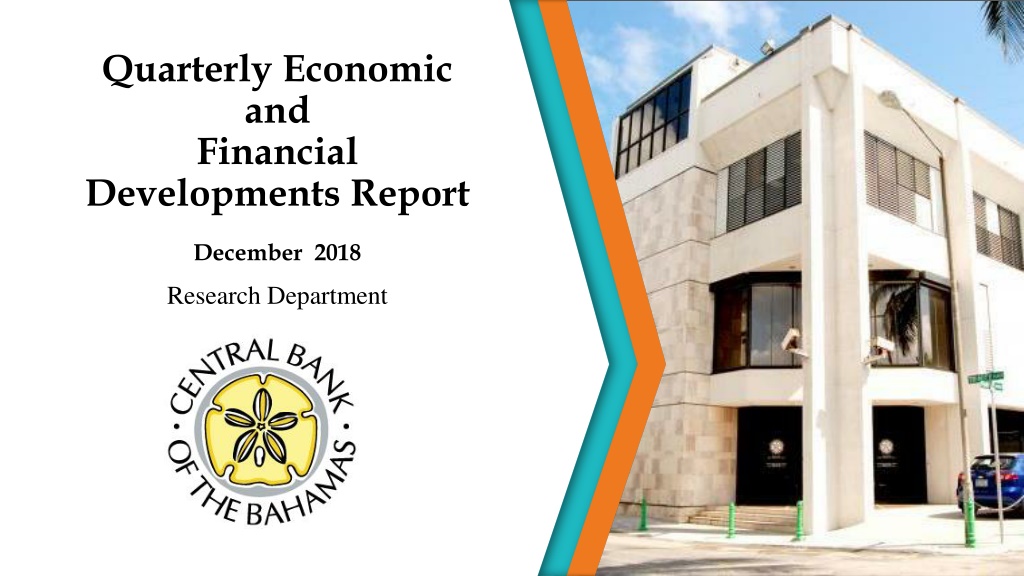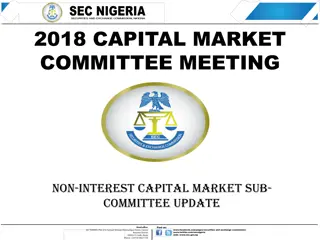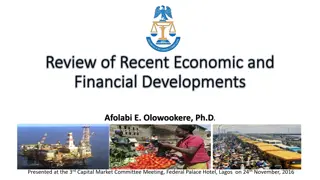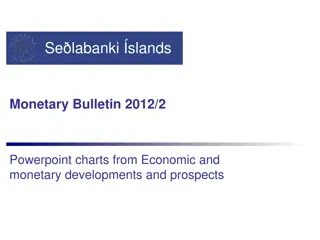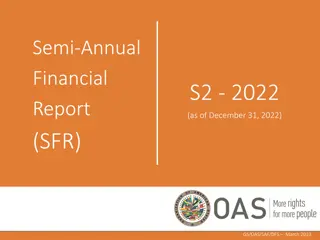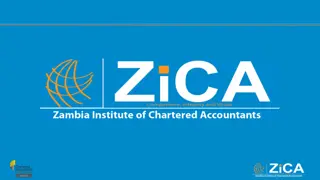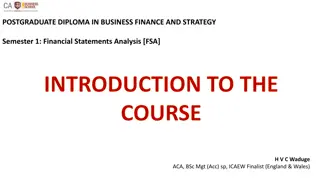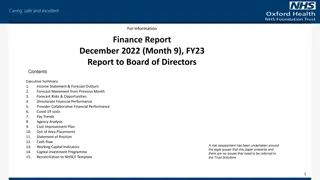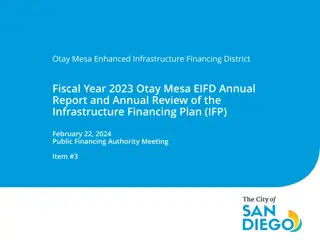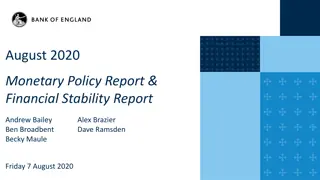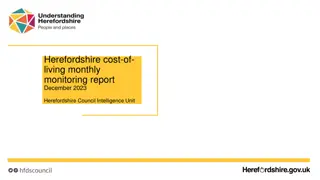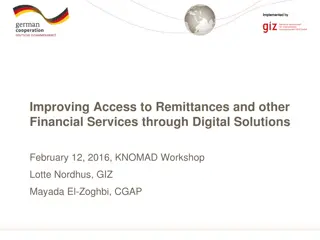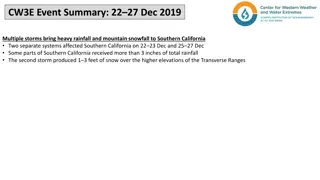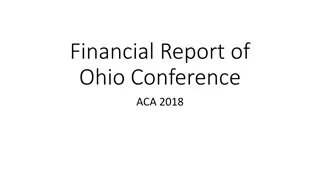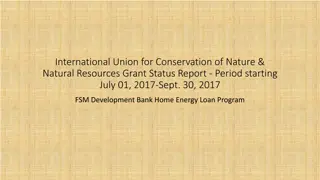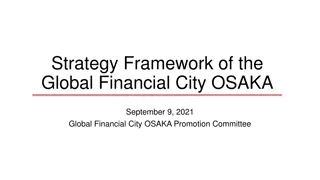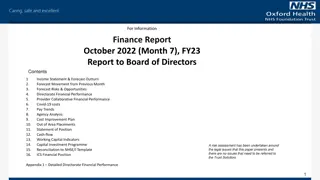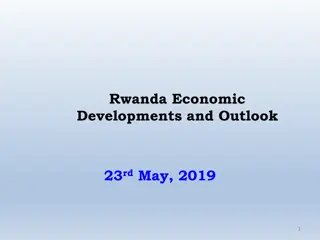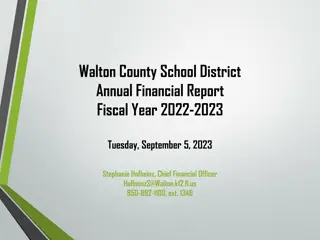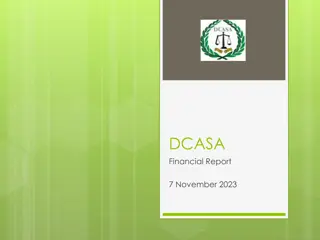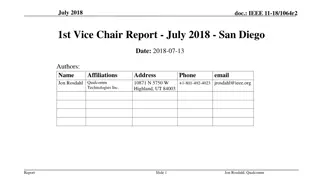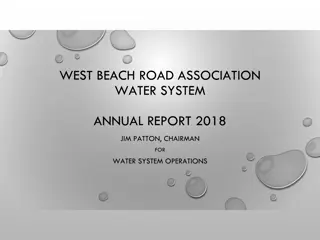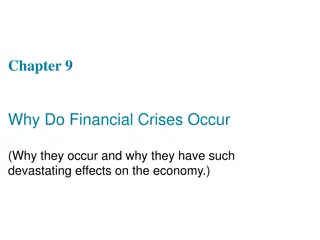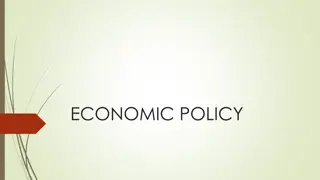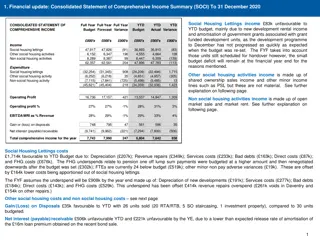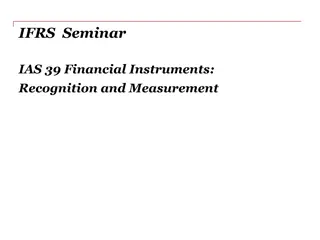Economic and Financial Developments Report December 2018
The Bahamian economy showed modest growth in 2018, driven by improvements in tourism and foreign investment inflows. The construction sector received a boost, and consumer price inflation increased following a VAT rate hike. Government deficit narrowed, revenue growth outpaced expenditure increases, and liquidity contracted. Global economic forecasts point to softer momentum in 2018, with revised growth forecasts. The tourism sector saw an uptrend in visitor departures and arrivals, with improvements in international passenger numbers.
Download Presentation

Please find below an Image/Link to download the presentation.
The content on the website is provided AS IS for your information and personal use only. It may not be sold, licensed, or shared on other websites without obtaining consent from the author. Download presentation by click this link. If you encounter any issues during the download, it is possible that the publisher has removed the file from their server.
E N D
Presentation Transcript
Quarterly Economic and Financial Developments Report December 2018 Research Department
Domestic Economic Developments Indications are that the Bahamian economy maintained its modest growth trajectory in 2018, reflecting mainly the improvement in tourism. Foreign investment inflows provided impetus to the construction sector. For 2018 tourist total departures firmed by 13.8% The increase in construction sector output remained fueled by ongoing foreign investment projects. During the twelve months to September, consumer price inflation firmed by 64 basis points to 1.98%, following the recent VAT rate hike. Real Sector In FY2018/2019, the Government s deficit for the first six months narrowed by 31.4% to $174.3 million, as revenue growth outstripped expenditure increases. Aggregate revenue strengthened by $129.5 million (14.7%) to $1,010.3 million, which outpaced the $50.0 million (4.4%) uptick in expenditure to $1,184.6 million. Fiscal Sector For the full year, liquidity contracted, owing to increased commercial banks financing to the Government, in contrast to a fall in the B$ deposits base. External reserves fell during the year, reflecting increases in both private and public sector demand. Monetary Sector 2
Global Economic Forecasts International economic conditions, particularly in the US affect Bahamian tourism performance. In January 2019, the IMF lowered its global growth forecast for 2019 by 20 basis points to 3.5%, relative to October s update. % Real GDP Growth 12 10 The downward revision to the global growth forecast reflects softer momentum in the second half of 2018, in addition to weakened financial market sentiment. 8 6 4 Difference from October 2018 projections: 2 The Euro Area (-30 basis points to 1.6%) 0 2008 2009 2010 2011 2012 2013 2014 2015 2016 2017 2018 2019 Canada (-10 basis points to 1.9%) -2 Projections for The United States, China, and The United Kingdom were unchanged at 2.5%, 6.2%, and 1.5%, respectively. -4 World United States United Kingdom -6 3 Euro Area China
International Airport Departures (January December 2018) Data from the Nassau Airport Development (NAD) Company showed a strong uptrend in visitor departures by air in 2018. Departures improved by 13.8%, relative to a 0.8% decline in 2017. Departing non-US visitors rose by 17.4%, strongly reversing a 1.8% softening in 2017. U.S. destined departures rebounded by 13.2%, from a 0.6% decrease in 2017. Departures vs. 2008 Recession January - December % 1.2 1.1 1 0.9 0.8 International passenger departures through the Nassau airport were the highest since 2012. 0.7 0.6 2009 2010 2011 2012 2013 2014 2015 2016 2017 2018 Source: Nassau Airport Development Company Note: All figures are net of domestic departures. Total 2008 5
Visitor Arrivals (January September 2018) Official data from the Ministry of Tourism for the September revealed that total visitor arrivals improved by 8.5%, relative to a 5.3% reduction in the prior year. New Providence Grand Bahama Family Islands nine months to 2017 2018 2017 2018 2017 2018 Air Arrivals Air arrivals recovered by 16.5%, following a 8.4% decrease in 2017. -7.3% 18.8% -50.7% 3.3% 10.9% 12.0% Sea arrivals rose by 6.1%, vis- -vis a 4.3% contraction in 2017. Sea Arrivals 6.7% -7.1% -28.6% 9.6% -8.6% 28.2% The upturn reflected improvements in both stopover and cruise indicators in Grand Bahama and the Family Islands and, gains in the stopover segment in New Providence. Total Arrivals 2.4% 0.1% -32.0% 8.9% -5.8% 25.4% 6 Source: Ministry of Tourism
Airbnb:Snapshot (as at December 2018) Strong interest in vacation rentals is an important contributor to the onshore visitor market growth. Total listings: 304 Occupancy rate: Entire place listings (35.0%) and hotel comparable (38.7%) Total listings: 323 active Occupancy rate: Entire place listings (38.4%) and hotel comparable (40.1%) All Islands 2806* total active listings Occupancy rate: Entire place listings (42.5%) and hotel comparable (45.1%) Total listings: 1063 active Occupancy rate: Entire place listings (49.6%) and hotel comparable (51.5%) Total listings: 266 active Occupancy rate: Entire place listings (45.2%) and hotel comparable (46.6%) Source: AirDNA * Figure includes listings from islands whose data has not been provided. 7
Airbnb: Occupancy Rate Trends (December 2018) Occupancy Rate Entire Place Listings Occupancy rate increased to 39.8% from 39.2% in the previous year. 70% 60% 50% 40% Hotel Comparable Listings Occupancy rate rose to 43.3% from 42.9% in the previous year. 30% 20% 10% 0% Jul-17 Feb-18 Mar-16 Mar-17 Feb-16 Jun-16 Jul-16 Feb-17 Jun-17 Jun-18 Jul-18 May-16 Nov-16 May-17 Mar-18 May-18 Nov-18 Apr-16 Apr-17 Apr-18 Nov-17 Jan-16 Jan-17 Aug-16 Aug-18 Oct-16 Sep-17 Jan-18 Oct-18 Aug-17 Sep-16 Sep-18 Oct-17 Dec-16 Dec-17 Dec-18 Entire Place Hotel Comparable Source: AirDNA 8
RECENTLY ANNOUNCED FOREIGN INVESTMENT PROJECTS 9
Sterling Hurricane Hole - update Paradise Island $250 million project, partially completed and open by June 2020; everything inclusive of Marina completed by 2024 Retail portion has already attracted interest of prospective tenants Will generate about 600 jobs Marina will be able to accommodate 200-300 ft. yachts Plans to utilize renewable energy sources The project broke ground on, January 25, 2019 and has already started hiring professionals Source: The Tribune and the Nassau Guardian Photo Source: Tribune
Other Recently Announced Developments Disney Cruise Line at Lighthouse Point Jack s Bay Development, Eleuthera A $350-$400 million investment A $400 million investment over 5 years and 4 phases Low density eco-tourism destination that will employ at least 120 persons To feature an 18-hole golf course, restaurants, golf pro shop, 517 building inventory (bungalows, villas, condos, lots), a helicopter landing pad, club house, Marina and a commercial complex About 20% of the 700 acre property would be developed, while 170 acres of the land would be donated to the Government for conservation and another 100+ acres of salt ponds would remain untouched Has potential to bring in 540K 1 million visitors to Eleuthera annually Source: The Bahamas Investment Authority
EMPLOYMENT 12
Labour Force Survey The recent employment gains trailed labour force participation growth. Unemployment Rate November 2012 - 2018 % 18.0 The total number of employed persons increased by 3.4% when compared to November 2017 (up by 6,830). 15.7 15.4 16.0 14.8 14.0 14.0 Nonetheless, the unemployment rate rose by 60 basis points vis- -vis November 2017 to 10.7%, with discourage workers falling by 0.2%. 11.6 12.0 10.7 10.1 10.0 8.0 A year-on-year analysis of the jobless rate for the primary job markets revealed: An increase of 40 basis points in New Providence to 11.0%. A 20 basis point decline in Grand Bahama to 11.9%. A 90 basis point decrease in Abaco to 7.7%. 6.0 4.0 2.0 0.0 2012 2013 2014 2015 2016 2017 2018 Source: Department of Statistics 13
INFLATION 14
Retail Price Index Annual retail price inflation rose to 1.98% through September 2018, from 1.34% in 2017, as pass-though from the VAT increase helped pushed average costs higher for restaurant & hotel services (4.99%), recreation & culture (3.86%), and food & non-alcoholic beverages (2.44%). Introduction of 7.5% VAT Increase in VAT to 12.0% 8.0% 6.0% 4.0% September inflation rate:1.98% 2.0% 0.0% Mar-14 Jun-14 Sep-14 Dec-14 Mar-15 Jun-15 Sep-15 Dec-15 Mar-16 Jun-16 Sep-16 Dec-16 Mar-17 Jun-17 Sep-17 Dec-17 Mar-18 Jun-18 Sep-18 -2.0% -4.0% -6.0% -8.0% Inflation rate Housing, Water, Gas, & Electricity Rate Transportation Rate Restaurants & Hotels Rate 15 Source: Department of Statistics and The Central Bank of The Bahamas
Oil Price Trends In December 2018, crude oil prices fell by 8.4%, relative to the previous month, to a one year low of $53.80 per barrel as fear surrounding over supply in the market mounted. The mean of the forecasts suggest that during the first quarter of 2019, crude oil prices could average a higher $75.37 per barrel. Oil Trends USD/barrel 90 80 70 60 50 40 Forecasted Values 30 20 10 0 Jun-15 Sep-15 Dec-15 Mar-16 Jun-16 Sep-16 Dec-16 Mar-17 Jun-17 Sep-17 Dec-17 Mar-18 Jun-18 Sep-18 Dec-18 Mar-19 Jun-19 Sep-19 Dec-19 Mar-20 Jun-20 Sep-20 Dec-20 Oil Prices (right axis) Oil Futures (bloomberg) 16 Source: Bloomberg
Oil Imports The fuel surcharge in electricity bills has been steadily increasing over the year. Oil prices decreased during the third quarter of 2018 and are expected to normalize gradually over the near term. BPL s Fuel Surcharge (cents/kwh) Oil Imports (Volume and Value) 3 300 30 June 2013 all time high of 28.35 cents per kWh 2.5 250 19.2 per kWh as at Oct 2018 25 Thousands of Barrels cents/kwh 2 200 20 B$ million 1.5 150 15 10 1 100 5 0.5 50 0 0 0 Jun-13 Dec-13 Jun-14 Dec-14 Jun-15 Dec-15 Jun-16 Dec-16 Jun-17 Dec-17 Jun-18 Mar-13 Mar-14 Mar-15 Mar-16 Mar-17 Mar-18 Sep-13 Sep-14 Sep-15 Sep-16 Sep-17 Sep-18 Mar-13 Mar-14 Mar-15 Mar-16 Mar-17 Mar-18 Dec-13 Dec-14 Dec-15 Dec-16 Dec-17 Sep-13 Sep-14 Sep-15 Sep-16 Sep-17 Sep-18 Jun-13 Jun-14 Jun-15 Jun-16 Jun-17 Jun-18 Oil Imports Volume Oil Imports Value 17 Source: Department of Statistics and The Central Bank of The Bahamas
Fiscal Sector Central Government Fiscal Deficit B$Millions During the first six months of FY2018/19, the deficit contracted to $174.3 million, relative to the same period of FY2017/18. 3000 2500 2000 Revenue: grew by $129.5 million (14.7%) to $1,010.3 million. VAT receipts rose by $81.2 million (25.5%) to $399.5 million. 1500 1000 500 0 Expenditure: rose by $50.0 million (4.4%) to $1,184.6 million. Recurrent outlays grew by $94.0 million (9.4%) to $1,097.7 million. 2018-19* 2008-09 2009-10 2010-11 2011-12 2012-13 2013-14 2014-15 2015-16 2016-17 2017-18 -500 -1000 Revenue Expenditure Surplus/Deficit Budgeted Source: The Central Bank of The Bahamas *Data for the first six months of FY2018-19. 19
Fiscal Responsibility Objectives Transparency Accountability Responsibility 0.5% of GDP Fiscal balance not to exceed the 0.5% target, from FY2020/21 onwards Establishment of a Fiscal Responsibility council 1.8% of GDP Fiscal balance not to exceed in 2018/2019 Public Financial Management bill, 2018 Provide the legal framework to support the broader introduction of the Integrated Financial Management Information System 50% Reduction of debt to no more than Public Debt Management bill, 2018 Governance framework for the prudent management of Government debt activities 1.0% of GDP Fiscal Balance not to exceed in FY2019/20 Public Procurement bill, 2018 Establish a procurement board 20
First Six Months FY 2018/2019 (Actuals Compared to Total Budget) Revenue Expenditure Percentages portion of the budget has been used thus far (First six months FY18/19). indicate what 38% 41% Thus far, less than 50.0% of the budget has been utilized for all the categories. When compared to the previous fiscal year, revenue is higher by 14.7% and expenditure grew by 4.4%. 37.1% Tax Revenue 49.5% Non-Tax Revenue 42.4% Recurrent Expenditure 29.1% Capital Expenditure 21
Commercial Bank Liquidity Rebounded commercial bank lending (mainly to Government) in the context of B$ deposit base reduction led to decline in liquidity in 2018. Trends corresponded to financing of increased net foreign currency outflows for private sector trade payments and public sector debt servicing. B$Millions Total Liquidity 3,500.0 In 2018, excess liquid assets decreased by $265.5 million to $1.5 billion, relative to a $351.2 million expansion in 2017, when Government obtained external loan proceeds. 3,000.0 2,500.0 2,000.0 1,500.0 Narrower liquidity (cash and central bank balances) fell by $186.2 million, vis- -vis a $133.8 million growth in 2017. 1,000.0 500.0 0.0 Cash & Other T-Bills Govt. Securities 23 Source: The Central Bank of The Bahamas
Lending Conditions Bahamian dollar domestic credit rose by $68.0 million in 2018, after 2017 s $328.0 million contraction. Net claims on the Government recovered by $143.9 million, following a $159.6 million reduction a year earlier, when the reliance was external financing. Credit to public corps. increased by $28.1 million, reversing the 2017 decline of $7.1 million. In contrast, private sector credit contracted further by $104.0 million in 2018, after a $161.3 million decline in 2017. Consumer credit by $79.6 million Mortgages by $15.1 million Commercial credit by $9.4 million 24
Credit Quality Indicators Credit Arrears % B$Millions At end-Dec 2018, the arrears rate for total private sector credit was lowered to 14.3% from 15.4% in the previous year. 2600 25.0% 2400 2200 20.0% 2000 1800 1600 15.0% 1400 The NPL rate (arrears over 90 days) fell to 9.1%(9.9% last year) 1200 10.0% 1000 800 600 5.0% 400 The shorter-term arears rate fell to 5.2% (5.5% in 2017) 200 0 0.0% Dec-08 Mar-09 Dec-09 Mar-10 Dec-10 Mar-11 Dec-11 Mar-12 Dec-12 Mar-13 Dec-13 Mar-14 Dec-14 Mar-15 Dec-15 Mar-16 Dec-16 Mar-17 Dec-17 Mar-18 Dec-18 Jun-09 Jun-10 Jun-11 Jun-12 Jun-13 Jun-14 Jun-15 Jun-16 Jun-17 Jun-18 Sep-09 Sep-10 Sep-11 Sep-12 Sep-13 Sep-14 Sep-15 Sep-16 Sep-17 Sep-18 NPLs (left axis) Arrears/Total Loans (right axis) Total Arrears (left axis) NPL/Total Loans (right axis) 25 SOURCE: The Central Bank of The Bahamas
External Reserves External reserves contracted by $210.9 million to $1,197.4 million at end-2018. Balances, instead, rose by $506.2 million in 2017 (due to Government s external loan proceeds). Import Cover Ratio 8 6 4 2 0 Q1 Q2 Q3 Q4 Q1 Q2 Q3 Q4 Q1 Q2 Q3 Q4 Q1 Q2 Q3 Q4 Q1 Q2 Q3 Q4 Q1 Q2 Q3 Q4* Year-end reserves were equivalent to approx. 4.4 months of current year s total merchandise imports, compared to 5.1 months in 2017 (Benchmark is 3 months). 2013 2014 2015 Non-Oil 2016 Total 2017 2018 External Reserves to Demand Liabilities B$M External balances represented 88.1% of Central Bank s compared to 95.2% at end-2017. (Target is 90% - 100%). 2,000.00 120% 100% demand liabilities, 1,500.00 80% 1,000.00 60% 40% 500.00 20% - 0% Q1 Q2 Q3 Q4 Q1 Q2 Q3 Q4 Q1 Q2 Q3 Q4 Q1 Q2 Q3 Q4 Q1 Q2 Q3 Q4 Q1 Q2 Q3 Q4 Note: Latest calculations use balance of payments data for 3rd Qtr. 2018, along with external reserves for week ending Dec. 26, 2018 were used. 2013 2014 2015 2016 2017 2018 Source: The Central Bank of The Bahamas 26 Reserves Demand Liabilities Ratio
OUTLOOK 27
Real Sector and Fiscal Sector Real Sector The Bahamian economy is expected to maintain its modest growth path over the near- term, buoyed by gains in tourism. Construction sector activity should be supported by several varied-scale foreign investment projects. Employment conditions are projected to continue to strengthen gradually, but jobless rate reduction will depend on gains that exceed labour force participation growth. Inflation indicators are expected to firm over the near-term, as the pass-through effects from value added tax (VAT) increase remain traceable at least through June 2019. Fiscal Sector Successful implementation of measures to curtail expenditure growth and strengthen revenue administration will remain crucial to the Government s efforts to reduce the deficit and improve debt indicators over the medium-term. 28
Monetary Sector Bank liquidity is likely to remain elevated for an extended period, as banks maintain a cautious lending posture and households continue to deleverage from debt. Credit arrears, inclusive of non-performing loans (NPLs) are anticipated to continue their downward trajectory, amid sustained resolution and debt restructuring efforts. Banks are projected to stay highly capitalized, thereby mitigating any threats to financial sector stability. External reserve balances are projected to remain above international benchmarks, and are expected to rise in the near future, reflecting the seasonal increase in tourism related receipts. 29
Risks To The Outlook Fiscal: Global: Inflation: Tourism: Political tension in key source markets could frustrate visitor arrivals growth. Employment: Softness in tourism, especially within large-scale properties, could lead to reversals in job gains. External Reserves: Higher demand for foreign exchange due to rising fuel costs and elevated government borrowing could slow or reverse gains. Prolonged trade tensions, restart of the U.S. government shutdown, and consistent interest rate hikes may slow global economic growth. The persistent threat of hurricanes , and negative external shocks could slow or stall deficit reduction efforts. Uncertainties in global oil production could result in continued volatility in energy costs and overall prices. 30
The End 31
